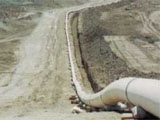|
|
TODAY.AZ / Business
The Washington Times: "Caspian pipeline to bring oil, relief for West"
13 July 2006 [11:28] - TODAY.AZ

There will be no shortage of plaudits when dignitaries from 50 countries meet on Turkey's southern coast today to celebrate the official opening of the Baku (Azerbaijan)-Tbilisi (Georgia)-Ceyhan (Turkey) pipeline.
More than a decade and $4 billion in the making, the 1,100-mile Baku-Tbilisi-Ceyhan (BTC) pipeline will soon be pumping 1 million barrels per day of Caspian oil westward.
With Saudi Arabia's daily exports reaching 9 million barrels per day, that may not seem much. But with prices soaring and energy supplies increasingly concentrated in the Persian Gulf and Russia, analysts say it brings the West vital diversity.
Eight more gas and oil pipelines are on the drawing board, and Turks see the pipeline as another selling point in Ankara's campaign to shoehorn Turkey into a reluctant European Union.
Western Europe is intensely conscious of its dependence on Russia for gas since Gazprom, Russia's state-controlled gas monopoly, cut supplies to Ukraine and other countries last winter, says Yalim Eralp, a retired Turkish diplomat.
"By offering an alternative energy corridor, Turkey can both help Europe and increase its own attractiveness in European capitals."
But as heads of state gird themselves for what may be a stormy, energy-obsessed Group of Eight summit in Russia this weekend, analysts fear the BTC pipeline's strategic value may be less than its proponents claim.
Russian pipelines will continue to carry the majority of Caspian oil to the West. And more importantly, Turkey itself has turned to Moscow for more and more of its energy needs and now purchases 65 percent of its natural gas from its northern neighbor.
The BTC pipeline was built with staunch U.S. support to "create an East-West hub independent of Russia, tying Central Asia to the West," said Bulent Aliriza, a Turkey specialist at the Washington-based Center for Strategic and International Studies.
"Now that it has been built, the irony is that the hub country is more dependent on Russia than before."
Ankara-based energy specialist Necdet Pamir said that dependence has left Turkey -- a vital NATO ally against the former Soviet Union -- vulnerable to political pressure from Moscow.
Russia has already tried to persuade Turkey to waive standard procedures on bidding for energy contracts it is interested in, he said. More significantly, Moscow is eager to see Turkey carry Russian gas to Central Europe through Nabucco, a 1,860-mile pipeline project the EU hopes will run from Azerbaijan to Austria by 2011.
Given that the purpose of Nabucco is to provide Europe with a Caspian alternative to Russian gas, some analysts see Moscow's suggestion as tantamount to sabotage.
Zeyno Baran, a Caspian and Turkish specialist at the Hudson Institute in Washington, insists Turkey is not deliberately favoring Russia over the West, but worries that Ankara's juggling act could eventually lead to political problems with Washington.
By Nicholas Birch
/www.washingtontimes.com/
URL: http://www.today.az/news/business/28130.html
 Print version
Print version
Connect with us. Get latest news and updates.
See Also
- 23 October 2025 [12:59]
Greco-Roman wrestler crowned world champion - 23 October 2025 [11:14]
Uzbekneftegaz and SOCAR discuss acceleration of geological exploration in Ustyurt Plateau - 23 October 2025 [10:41]
Azeri Light crude edges higher at Augusta and Ceyhan ports - 23 October 2025 [10:20]
Autumn sowing campaign launched in Jabrayil district - 22 October 2025 [19:21]
State budget expands 50-fold over three decades amid strong economic growth - 22 October 2025 [18:19]
Cargo transport via East-West Corridor up by 90% since 2022 - 22 October 2025 [15:57]
Azerbaijan strengthens economic ties with Latvia, Estonia, and Finland - 22 October 2025 [14:38]
New Azerbaijan-Kazakhstan deal aims to boost SME services and innovation - 22 October 2025 [13:19]
Azerbaijan targets 25 mln tons throughput at Baku Port - 21 October 2025 [12:53]
Masdar and Azerbaijan mark 1 bln kWh at Garadagh Solar Plant
Most Popular
 Azerbaijan and Kazakhstan are taking region's geopolitics into their own hands
Azerbaijan and Kazakhstan are taking region's geopolitics into their own hands
 Vietnam and Finland vow to strengthen aviation ties
Vietnam and Finland vow to strengthen aviation ties
 Pashinyan thanks President Ilham Aliyev for lifting transit restrictions toward Armenia
Pashinyan thanks President Ilham Aliyev for lifting transit restrictions toward Armenia
 President Ilham Aliyev presents Yagub Eyyubov with "Istiglal" Order
President Ilham Aliyev presents Yagub Eyyubov with "Istiglal" Order
 Steel remains backbone of global industry amid shifting economic dynamics
Steel remains backbone of global industry amid shifting economic dynamics
 Azerbaijan targets 25 mln tons throughput at Baku Port
Azerbaijan targets 25 mln tons throughput at Baku Port
 Azerbaijani and Georgian prime ministers meet in Tbilisi
Azerbaijani and Georgian prime ministers meet in Tbilisi
